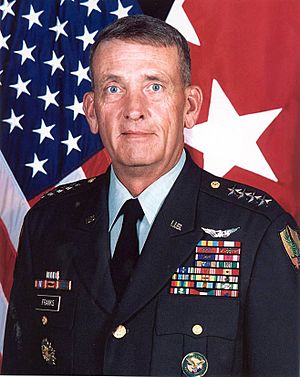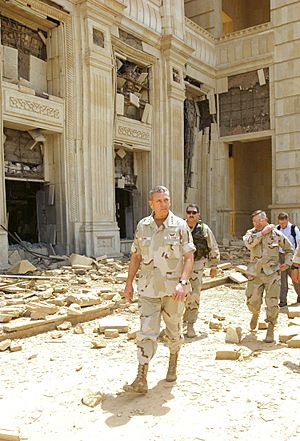Tommy Franks facts for kids
Quick facts for kids
Tommy Franks
|
|
|---|---|

Official portrait, 2000
|
|
| Birth name | Tommy Ray Bentley |
| Born | 17 June 1945 Wynnewood, Oklahoma, U.S. |
| Allegiance | United States |
| Service/ |
United States Army |
| Years of service | 1965–2003 |
| Rank | |
| Commands held | United States Central Command Third United States Army 2nd Infantry Division 82nd Field Artillery Regiment 2nd Battalion, 78th Field Artillery |
| Battles/wars |
See list
|
| Awards | Defense Distinguished Service Medal (3) Army Distinguished Service Medal (2) Legion of Merit (3) Bronze Star Medal (5) Purple Heart (3) Presidential Medal of Freedom Knight Commander of the Order of the British Empire (United Kingdom) |
| Alma mater | University of Texas at Arlington |
| Spouse(s) |
Cathryn Carley
(m. 1969) |
Tommy Ray Franks (born 17 June 1945) is a retired United States Army general. He was the Commander of the United States Central Command. This meant he was in charge of all U.S. military operations in a large area. This area included 25 countries, like those in the Middle East.
General Franks took on this important role on 6 July 2000. He led the attack on the Taliban in Afghanistan in 2001. This was a response to the September 11 attacks on the World Trade Center and The Pentagon. He also led the 2003 invasion of Iraq and helped remove Saddam Hussein from power. Franks retired from the Army on 7 July 2003.
Contents
Growing Up and School
Tommy Ray Franks was born as Tommy Ray Bentley in Wynnewood, Oklahoma. He was later adopted by Ray and Lorene Franks. He went to high school in Midland, Texas. He graduated one year before First Lady Laura Bush.
Franks first went to the University of Texas at Austin. He left college after two years. He decided to join the United States Army to make a big change in his life. Later, while in the military, he went back to school. He earned a degree in Business Administration from the University of Texas at Arlington in 1971. He also earned a Master of Science degree from the Shippensburg University of Pennsylvania.
Military Service
Franks joined the United States Army in 1965. He trained to be a cryptologic analyst. This means he worked with secret codes. He quickly showed strong leadership skills. In 1967, he became a second lieutenant, which is an officer rank.
Early Army Roles
Franks served in Vietnam with the 9th Infantry Division. He helped direct artillery fire. After Vietnam, he commanded a cannon battery at Fort Sill. In 1973, he was sent to West Germany. There, he commanded different units.
In 1976, Franks worked at The Pentagon. He was an Inspector General. This role involves checking how the Army follows its rules. He also worked for the Chief of Staff of the Army.
Leading Major Units
In 1981, Franks returned to West Germany. He commanded a field artillery battalion for three years. He then attended the Army War College. After that, he commanded the 1st Cavalry Division Artillery in Texas.
Franks became a general officer in 1991. He served as Assistant Division Commander during Operation Desert Shield and Operation Desert Storm. These were major military operations in the Middle East. From 1995 to 1997, he commanded the 2nd Infantry Division in Korea.
Commander of Central Command
In 1997, Franks took command of the Third United States Army. In June 2000, he was promoted to general. He became the Commander in Chief of United States Central Command. This was a very important job.
General Franks led the 2001 invasion of Afghanistan. This operation removed the Taliban government. He also led the 2003 invasion of Iraq. This operation led to the removal of Saddam Hussein.
Some people have criticized Franks for his decisions during the Battle of Tora Bora in Afghanistan. They say his choices might have allowed Osama bin Laden to escape. Franks and other military leaders defended his decisions. They said there was no clear proof that bin Laden was at Tora Bora. However, some, like a Delta Force commander, believed the evidence was strong.
General Franks announced his retirement on 22 May 2003. He officially retired on 7 July 2003.
Iraq War Decisions
Some authors have discussed General Franks's decisions during the Iraq War. They suggest he faced pressure to reduce the number of U.S. troops. They also questioned his choice to keep ships carrying equipment for the 4th Infantry Division at sea. Franks believed this would trick the Iraqis into thinking an attack from the north was still coming. Others, like Colin Powell, disagreed with this view.
After the main fighting in Iraq ended, Franks was preparing for retirement. Some critics say there was a lack of clear leadership at U.S. Central Command during this time. They also noted that the command of U.S. forces in Iraq changed.
Some officers who worked with Franks said he was good at planning battles. However, they felt he might not have focused enough on the bigger picture or long-term plans. They also said he sometimes did not want to hear different ideas.
Weapons of Mass Destruction
General Franks commented on the search for weapons of mass destruction (WMDs) in Iraq. He said he was surprised that WMDs were not used against U.S. troops. No WMDs were found in Iraq after the invasion.
Awards and Honors
General Franks received many awards for his service. These include:
- Defense Distinguished Service Medal (3 awards)
- Army Distinguished Service Medal (2 awards)
- Legion of Merit (3 awards)
- Bronze Star Medal (5 awards)
- Purple Heart (3 awards)
- Presidential Medal of Freedom
- Knight Commander of the Order of the British Empire (from the United Kingdom)
Life After the Army
Since 2003, General Franks has run his own company, Franks & Associates LLC. This company helps with disaster recovery. In 2004, he published his book, American Soldier. It became a #1 best-seller. The book shares his memories from his time in the military.
In 2004, President George W. Bush gave Franks the Presidential Medal of Freedom. This is the highest award a civilian can receive in the U.S. Franks also became a spokesperson for Teen Arrive Alive. This company uses GPS in cellular phones to help parents know how fast their teenage children are driving.
General Franks has served on the boards of several companies and foundations. He is on the board of directors for the National Park Foundation. He also advises the Central Command Memorial Foundation and the Military Child Education Coalition. He is a spokesperson for the Southeastern Guide Dogs Organization.
A museum dedicated to General Franks is located in Hobart, Oklahoma. He lives in Roosevelt, Oklahoma.
Charity Concerns
In 2008, some news reports raised questions about Franks's involvement with a charity. The charity was called Coalition to Salute America's Heroes. Franks was paid $100,000 to let the charity use his name to raise money for wounded soldiers. However, critics found that only a small part of the money raised actually went to the veterans. Most of it went to the charity's operations.
Franks stopped supporting the group in late 2005. He said he ended his connection when he realized most of the money he helped raise did not go to the troops.
See also
 In Spanish: Tommy Franks para niños
In Spanish: Tommy Franks para niños
 | Percy Lavon Julian |
 | Katherine Johnson |
 | George Washington Carver |
 | Annie Easley |


